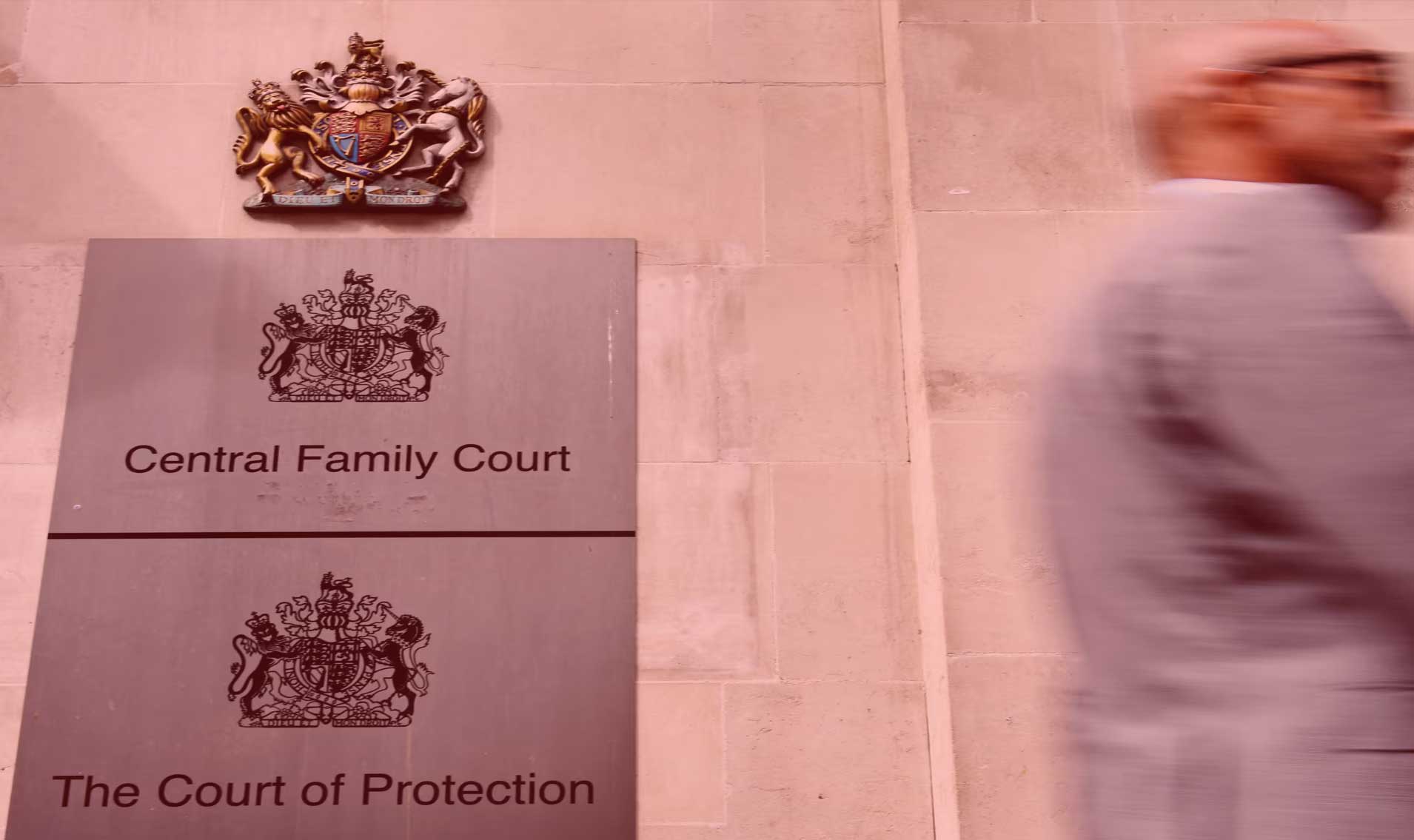Month: September 2024
What to do if someone lost capacity with no power of attorney in place? (Deputyship)
Many people don’t like to think of a time where they may not have the mental capacity to make their own decisions, people seem to have the attitude that it will never happen to them. This could not be further from the truth. More and more people are being diagnosed with medical conditions that effect their ability to make their own decisions. Although some medical conditions may be a gradual deterioration in capacity, there are also circumstances where capacity can deteriorate rapidly.
The best thing to do would be to make a Lasting Power of Attorney whilst you still have capacity, but this is not always the way things happen.
The process to obtaining a deputyship is more expensive and takes much longer than a Lasting Power of Attorney, so if you take anything from this article it is that you should seriously think about making a Lasting Power of Attorney, but I will explain the process for if you lose your capacity without an LPA being in place.
Just like Lasting Power of Attorney there are two different types of deputyships.
1. Personal Welfare Deputy
2. Property and Financial Affairs Deputy
Who can be a Deputy
The person wishing to be a deputy would need to be over the age of 18 years. Be of demonstrably good character. This means that you might not be able to be a deputy if you have a criminal record, have been declared bankrupt. Also, you will need to know the person well if you are going to act as someone’s deputy.
Responsibilities of a Deputy
A Deputy will be responsible for helping you make decisions or making decision on your behalf. Your deputy should consider your level of mental capacity every time they make a decision for you. They cannot just assume it is the same at all times and for all kinds of things.
When a deputy is making a decision, they must:
- make sure it’s in the other person’s best interests
- consider what they’ve done in the past
- apply a high standard of care – this might mean involving other people, for example getting advice from relatives and professionals like doctors
- do everything you can to help the other person understand the decision, for example explain what’s going to happen with the help of pictures or sign language
They must not:
- restrain the person, unless it’s to stop them coming to harm
- stop life-sustaining medical treatment
- take advantage of the person’s situation, for example abuse them or profit from a decision you’ve taken on their behalf
- make a will for the person, or change their existing will
- make gifts unless the court order says you can
- hold any money or property in your own name on the person’s behalf
Who to apply
When you are deemed to have lost capacity, your loved one who wishes to be appointed as your legal deputy will need to obtain a COP3 capacity assessment by a doctor or specialist. The COP3 is the name of the form that will need to be submitted to the Office of the Public Guardian.
When the COP3 is complete and it has been established that you lack capacity, a COP1 application form will need to be completed by your proposed deputy, this will detail what they are apply for, be it one or both of the deputyships available.
Your proposed deputy will also need to complete a COP4 deputy’s declaration to declare that they wish to be appointed as your deputy.
Finally, a COP1B form may be needed to submit any supporting information to the application.
What happens after the application is submitted (deputy)
The court will aim to send a stamped copy of the application within a week of receiving it. This means the application is being considered (it has been ‘issued’).
Within 14 days of the application being issued, the proposed deputy must tell (sometimes called ‘serving’) the following people:
- the person they are applying to be a deputy for
- at least 3 people named in the application as having an interest, for example the person’s relatives, social worker or doctor
The proposed deputy must visit you and tell you:
- who’s applying to be your deputy
- that your ability to make decisions is being questioned
- what having a deputy would mean for you
- where to get advice if you want to discuss the application
During the visit your proposed deputy would provide you with:
- a completed notice about proceedings (COP14)
- an acknowledgment form (COP5)
- any other documents related to your application
They must also:
Tell 3 people named on the application that it has been issued.
Send them:
- a notice that an application form has been issued (COP15)
- an acknowledgment form (COP5)
- any other documents related to your application
They can be notified:
- by post to their home address
- by email
- in person
Within 7 days of serving the documents, they must download and fill in the relevant forms (sometimes called ‘certificates’) confirming they have told:
- the person they are applying to be deputy for – fill in a certificate of notification (COP20A)
- the other people named in the application – fill in a certificate of service (COP20B)
What happens next
The Court of Protection will then review the application and tell your proposed deputy if:
- your application has been approved or rejected
- you’ll need to pay a fee to set up a security bond before you can be appointed
- you have to provide more information to support your application, for example a report from social services
- it’s going to hold a hearing to get more information, for example if someone objected
What happens if a hearing is needed
A notice date will be provided to your proposed deputy. Your deputy must then visit you and tell you about the hearing. This must be done within 14 days of getting the notice and at least 14 days before the date of the hearing. Your proposed deputy will need to complete a COP14 form which gives notice about the proceedings. When the proposed deputy has complied with the notification a COP20A will need to be submitted to the Office of the Public Guardian.
Fees
The court application fee is currently £408 per type of deputyship therefore it would be £816 in total for both types of deputyships. This is a considerable difference to £82 or £164 if you wanted one or both Lasting Powers of Attorney.
This fee would be payable when making the application and does not include any costs which would be incurred if you were to require assistance form a legal professional.
Once the fee and applications and all the above has been complied with the Office of the Public Guardian will consider the application and make a decision on if the proposed deputy should be appointed. This can take some time.
As you can see this process is very long, confusing and expensive. Despite this, it is achievable if needed. Buy they best way to avoid having to go through this process would be get a Lasting Power of Attorney in place now while you can.
Our team at Baines Bagguley Penhale have the relevant expertise and experience, to provide you with appropriate advice.
For further information please visit our website at www.bbpsolicitors.co.uk. Or contact us for further information on 01524 401010.

Why Legal Services in the UK are Cheaper than in Most Places in the World..
Many clients in the UK Feel that they are paying toomuch for legal advice.
In this article, we are looking at the reasons why, in reality, the UK is very cost effective on legal fees.
Let’s start with a comparative.
If you take your car to a main dealer for work, the cost is currently (as at August 2024) at £92.11 per hour.
If you look at the cost of a UK Solicitor, the average legal fee for conveyancing is around £1,000 for the entire job. But what do you get for this?
From a time survey, the average time it takes to complete your legal work is 14.5 hours of work on a regular transaction. This makes it £68.96 per hour for a Solicitor to do the work for you. There are other costs on top of this (e.g. searches, tax and land registry fees) but the price per hour is really low.
What about hairdressing? surprisingly, any half decent salon is over £60.00 per hour.
Don’t get us wrong, a skilled mechanic and a skilled worker of hair magic are both very much worth their time. We would argue though that a profession such as law with the regulation we face may be pound for pound be a great investment.
So why is it cost effective?
1. Regulatory Framework and Market Competition
One of the reasons for the price of legal services in the UK is the enforced need to be clear on competition and pricing. Our own website has our literal price list displayed for everything we do.
We also have the legal services commission. Their role is to ensure fair and accessible legal services. A more cynical person may say it was in some part to make up for removing legal aid but we wouldn’t say that!
The introduction of the Legal Services Act 2007, for instance, was a significant step toward opening up the legal market. This Act allowed for the creation of Alternative Business Structures (ABS), enabling non-lawyers to own and invest in law firms.
The increased competition from ABSs and other legal service providers had the result in lowering prices across the board.
That said, an ABS, is normally run mostly by Solicitors and they always have to comply with tough regulation.
2. Technological Advancements and Legal Tech
The UK has been at the forefront of integrating technology into legal services, often referred to as “Legal Tech.” Manchester University is a world centre for technology and ai.
New technology has also automated many processes. By speeding up the admin, the Solicitors can work on the complex legal work. Concentrated legal advice!
We work with many legal tech companies. The Agent Site (www.theagentsite.co.uk) for example makes moving home easier, keeps you up to date and helps you fill in documents.
Investing in a commercial premises
Key things to think about when investing in a commercial premises
For many businesses the acquisition of a premises will be a significant financial investment and key to growth. However, the acquisition of a premises can be a time-intensive and lengthy process that requires you to do your due diligence, research and make smart investment decisions.
Here are some of the most important things that a buyer should be thinking about to achieve the best possible position for the investment:
Type of Property – Is the commercial property you are going to buy a leasehold of freehold?
This is really important to know as there are some key differences to be considered.
Freehold – If you own the freehold of the property this means you will own the whole of the premises and are free to use, alter or sub-lease part or the whole of the property as you wish (subject to any lender and / or planning authority consents). As a freehold owner, you will be responsible for all maintenance, repair and insurance of the property together with any additional costs that may become due from use of any private roads or shared carparks with adjoining neighbours.
However, owning a freehold will likely mean a large initial outlay for your business in respect of the purchase price.
Leasehold – If you own the leasehold of a property you will occupy the whole (or part) of a property under a lease for a contractual term. As a leasehold occupier of part you will only be responsible for the repair and maintenance of the part of the property you occupy with the Landlord responsible for the repair and maintenance of the exterior and remaining parts of the property (and such costs will most likely be recovered via a service charge).
The length of each lease can be negotiated to reflect the wishes of both parties and can also include assignment clauses and break clauses to protect you should you wish to terminate or transfer your lease at an earlier stage. Leases can therefore provide businesses with greater flexibility in their premises arrangements. The lease will govern any subletting and alterations.
It is important to consider which type of ownership would be more suitable for you or your business needs. For example, you may wish to consider if a short term lease of commercial property would be a better option in the first instance, particularly if your business is a new start-up.
Having decided that purchasing a property is the most suitable route for you, you may want to consider instructing a Buyer’s Agent. A Buying Agent can assist with negotiating key commercial terms and submitting the offers on your behalf. They can also provide advice on the suitability of the property for your needs.
Location
Location is key for commercial property not only in respect of whether a property is suitable for you or your prospective tenant but also in respect of external factors such as whether the property or the vicinity is prone to flooding, or is subject to planning and conservation designations or other restraints which may affect your intended use. Most of these factors will be picked up in the property searches.
Transport links and / or car parking to support both employee and client access should be properly considered. It is also prudent to consider the services available at the property and whether any additional works will be required to install or update services which are insufficient or unavailable.
Survey
Just as an individual may undertake a survey for residential property before they move house, it is always advisable for a prospective purchaser to commission a survey before proceeding with the purchase of a commercial property.
A survey would identify any potential issues with the premises, whether you are acquiring a freehold or leasehold interest in the property. This can be potentially beneficial if you are taking on a full repairing and insuring lease. The results of a survey can ensure that any issues are dealt with post-completion or may lead to a re-negotiation in price. Further, the results may persuade a landlord to accept a tenant’s repairing liability is limited by way of a schedule of condition. The schedule will document any specific defects that will fall outside of the tenant’s repair covenant.
Purchasing Entity
Having found the right property, you will want to consider how the property is to be owned. Buying a commercial property as an individual or partnership is commonplace but there may be reasons why buying a property as a limited company, limited liability partnership or through a SIPP may be preferable: speaking to your accountant or tax advisor is advisable before committing to buy the property.
Option to Tax and VAT Position
Tax plays an important consideration in commercial transactions. The default position for the sale of land and buildings is that they are exempt from VAT meaning that no VAT is payable by the buyer in addition to the purchase price. However, a Seller may have opted to tax the land or property. Once someone has opted to tax land or buildings then all supplies (including a freehold sale or leasing the property) would usually be subject to VAT on a standard rated basis. This is not usually a problem if the purchaser is themselves VAT registered.
There are circumstances where VAT will not be payable in addition to the purchase price where there is a valid option to tax and your accountant or tax advisor should be able to provide advice on whether these exceptions apply.
You may wish to check the VAT position in respect of the property before proceeding with any purchase.
It is also important to remember that SDLT is calculated and payable on both the purchase price and any applicable VAT on the purchase price.
Searches
Searches are typically commissioned in advance of exchange of contracts to ensure as much information as possible about the property is gathered and enquiries raised accordingly. A buyer is free to decide if they wish to commission searches unless the purchase is subject to finance in which case a lender will require that searches are commissioned (to include an environmental search, local search, drainage and water, highways and chancel).
SDLT
In addition to the VAT implications of a purchase, Stamp Duty Land Tax (SDLT) is payable on non-residential property where the purchase price (also referred to as ‘consideration’) paid is £150,000 or more. You may wish to do a quick calculation to give an idea of additional purchase costs or, we can do this on your behalf.
Service Charge
It is a common misconception that when buying a freehold property that there will never be a service charge payable as it is often misunderstood to be applicable to leasehold property only. There are circumstances where a freehold property, such as those on an estate, may be liable to pay an estate or other service charge for maintenance of the common parts. It is worth checking with the agent when negotiating the purchase to see if there are any estate or other service charges payable.
Financing
There are numerous options available when considering how best to finance any proposed property acquisition. A mortgage broker can often advise you on the most appropriate mortgage to suit your relative needs in line with your proposed timeline and objectives.
Alternatively, you may wish to consider raising capital through investors or other third-party funding. Investors may be happy to accept shares in the company or a profit percentage in return for their initial investment, this may benefit your business given that the capital, which would otherwise have been expended into the property, can be used elsewhere.
Each transaction is unique. Our team has experience in a wide range of sectors including offices, retail, industrial and leisure.
Please get in touch if you feel that we can assist you in purchasing your first commercial property or, if you are thinking of adding another property to your portfolio.
The Ground Rent Act: A Game-Changer in Property Rights
The Leasehold Reform (Ground Rent) Act marks a significant milestone in the evolution of property rights within the realm of leasehold properties in the United Kingdom. Enacted in response to mounting concerns and controversies surrounding escalating ground rents and leasehold terms, this legislation aims to reform the system, protect leaseholders, and provide a more equitable landscape for homeowners.
Understanding the Issue
The issue at the heart of this act revolves around onerous ground rents within leasehold agreements. Traditionally, leasehold arrangements have been common in the UK, particularly in the context of flats and apartments. Under this system, homeowners only own the property for the length of the lease, which can be as long as 999 years in some cases but often falls between 99 and 125 years. The land itself remains under the ownership of the freeholder, to whom ground rent is paid.
However, over time, some developers introduced clauses that exponentially increased ground rents, rendering them unaffordable and causing financial distress for leaseholders. The Leasehold Reform (Ground Rent) Act addresses this issue by placing limitations on ground rent escalation, thereby safeguarding leaseholders from unfair and exploitative terms.
Key Provisions of the Act
Limiting Ground Rent Escalation
A pivotal aspect of the act is the imposition of restrictions on ground rent escalation in new leasehold agreements. It prohibits the creation of leasehold contracts with ground rents that double more frequently than once every 20 years. Additionally, it mandates that ground rents for new leases must be set at a nominal amount, effectively eliminating the burdensome and skyrocketing charges faced by leaseholders.
Empowering Leaseholders
The legislation also grants leaseholders increased power and freedom concerning their properties. For instance, it offers leaseholders the right to extend their lease term by 990 years and eliminate ground rent altogether through a statutory process. This provision empowers leaseholders, granting them greater control over their properties and providing long-term stability in their homeownership.
Compulsory Redress for Leaseholders
Under the Leasehold Reform (Ground Rent) Act, leaseholders affected by onerous ground rents are granted access to legal recourse. They can seek redress through the First-tier Tribunal, enabling them to challenge unfair terms and seek amendments to their lease agreements. This mechanism serves as a means of protection for leaseholders adversely impacted by exploitative ground rent clauses.
Impact on the Property Market
The introduction of this legislation has brought about a seismic shift in the property market landscape. Developers, previously inclined toward establishing leasehold agreements with escalating ground rents, are now compelled to reconsider their practices. The focus has shifted towards the development of more equitable and sustainable property ownership structures, prioritizing the rights and interests of homeowners.
Additionally, the act has bolstered consumer confidence among prospective buyers, particularly those wary of entering into leasehold agreements characterized by exorbitant ground rents. It has paved the way for a more transparent and fairer property market, encouraging trust and fostering a conducive environment for homeownership.
Challenges and Future Considerations
While the Leasehold Reform (Ground Rent) Act represents a significant stride in rectifying issues plaguing leasehold properties, challenges persist. One such challenge involves the impact of this legislation on existing leasehold agreements. Addressing the concerns of leaseholders locked in unfavorable contracts prior to the enactment of the act remains a critical aspect that necessitates further attention and resolution.
Furthermore, the implementation of this act necessitates ongoing monitoring and assessment to ensure its efficacy in safeguarding the rights of leaseholders. Amendments or additional measures might be required to address emerging loopholes or unforeseen issues that may arise over time.
Conclusion
The Leasehold Reform (Ground Rent) Act stands as a pivotal measure aimed at rectifying the imbalance in leasehold agreements, specifically concerning ground rents. By curbing exploitative practices and empowering leaseholders with greater control over their properties, this legislation heralds a new era of fairness and equity within the UK property market. Its impact extends beyond legalities, fostering a renewed sense of trust and stability for homeowners navigating the complexities of leasehold arrangements. As the real estate landscape continues to evolve, the implications and effectiveness of this act will undoubtedly shape the future trajectory of property ownership, laying the groundwork for a more equitable and secure environment for leaseholders across the nation
Court is the final option?
In the past, there were always opportunities for alternative conflict settlement, which is now known as non-court dispute resolution, or “NCDR,” outside of court procedures.
There is now, however, a significantly higher expectation that parties should actively engage in NCDR throughout the length of proceedings under new process rules that went into effect last month, with potential financial repercussions if they do not. The range of non-confrontational dispute resolution (NCDR) options can result in a far less contentious and expensive conclusion than relying on lengthy divorce court proceedings, which can have a significant emotional toll on the parties involved. However, the court is a blunt instrument and, in certain cases, is the only viable option for determining a fair result.
With the intention of promoting early settlement of private law child and financial remedy procedures in the hopes of more peaceful results for families and lessening the load now placed on the family courts, new family process rules have been in effect since April 29, 2024.
But in practical terms, what does this imply, and how does it affect your case?
NCDR: What is it?
The term “methods of resolving a dispute other than through the court process,” which includes but is not limited to mediation, arbitration, assessment by an impartial third party (such as a private Financial Dispute Resolution procedure), and collaborative law, has been expanded to include those new provisions. The purpose of the intentionally incomplete list is to allow for the future addition of additional NCDR techniques.
The court may even delay a hearing without your approval in order to provide you a chance to participate in NCDR under the new regulations, which give it the authority to instruct the parties to do so when scheduling your case. Throughout the process, NCDR should be actively taken into consideration and should never leave your thoughts.
It will be necessary for parties to fill out a court document verifying whether or not they have participated in NCDR prior to each hearing. The parties must explain to the court why they are now requesting a court order if they show up in court even if they have participated in NCDR.
Does my court application enough with the preliminary Mediation and Information Assessment Meeting (‘MIAM’) that I had to attend?
Not nearly… In actuality, the exclusions meant that parties frequently avoided attending MIAMs, even though the procedure is intended to determine if a case was appropriate for mediation in particular. It is now much more difficult to avoid thinking about whether mediation is the right course of action in your situation because the exclusions are now much more limited.
The new regulations provide that, unless there are exclusions, a party’s failure to participate in NCDR or attend an MIAM shall be taken into consideration for assessing costs orders, particularly in financial remedy situations. As a result, MIAMs will become much harder to avoid, and failing to attend an MIAM or participate in NCDR without a valid excuse will give the court sufficient grounds to think about awarding costs to the party that participates in NCDR minimally or not at all.
The revisions require MIAM providers to inform participants of the possible advantages of NCDR, as well as the best type of NCDR and how to use it. The revisions will also provide the court the chance to decide whether an earlier, legitimate MIAM exemption still applies.
What benefits does NCDR offer over the legal system?
NCDR is known for helping people settle problems in a less confrontational, speedier, and frequently more economical manner. Moreover, NCDR gives you more influence over the procedure as opposed to having the court force a solution on you.
The links to alternatives to litigation, additional information, and commonly asked questions are provided below so you can see whether any of them might be a good fit for you.
Our Team at Baines Bagguley Penhale are qualified to conduct MIAMs (Mediation Information and Assessment Meetings) and offer substantive mediation (with regard to financial and/or child-related concerns). Get in touch with us today.
Issues that can arise with DIY Wills
There is an increase in the availability of precedent and template documents, which allow someone to make a Will themselves without taking any professional legal advice. Although these documents can appear to be more convenient and less expensive. As well as setting out your wishes and making things easier for your family, it can give arise to many issues. This could lead to extra costs for the estate. Also it is more stress for family members when administering the estate. Also this can make the process of grieving more difficult.
One of the most common mistakes with a DIY Will, is that the Will has not been executed correctly. There are set legal rules about the completion of a Will. If a Will has not been correctly executed, then it will not be a valid Will. In the event that the Will is not valid, there are two options. If there is a valid Will made before which would need to be followed to administer the estate. Or, if there is no Will then the estate would be distributed under the Rules of Intestacy.
For a Will to be valid, the Will has to be signed by the person making the Will. This person is called the Testator or Testatrix in the presence of two witnesses. Everyone must remain together throughout the whole signing process, and this has to be done in person. The witnesses must then sign the Will in the presence of the person making the Will and each witness. The witnesses should also include their details which are their name, address, and occupation on the Will under their signature. Also, the Will must be dated on the day that it is signed by the testator/testatrix and witnesses.
Another common issue is that there are no executors appointed on the Will document. An executor is the person or people who are responsible for the administering the estate. They have a responsibility to safeguard the assets, collect in the monies, pay off liabilities and distribute the estate. If there is no executor appointed in a Will, this does not invalid the Will. But there would have to an administrator appointed to deal with the estate. There are set list of people under the non-contentious probate rules who can be appointed as administrator. This may mean that the person or people that you believe to be most suitable to act in this role, may not be able to act.
Furthermore, another issue with a DIY Will is that there is usually no set wording. So, people can write their wishes in their own words. Although this could be seen as an advantage, the issue would be that the wording used could be misinterpreted. Then the wishes may not be followed as original intended. Whereas if a solicitor drafted your Will, they would ensure that all clauses are set out correctly. Also ensure that your wishes are clear to everyone that reads the Will.
So, the advantages of instructing a solicitor to assist you with the making and completion of a Will are:
- You can ensure that all the formalities for the completion of the Will are dealt with correctly.
- They will discuss all the clauses that you should include in your Will.
- They can consider with you on any issues that you are concerned about. Also, provide you with options for your Will.
- They will discuss inheritance tax planning.
- You will have peace of mind that your Will is valid and sets out your wishes clearly.
Our team at Baines Bagguley Penhale have the relevant expertise and experience, to provide you with appropriate advice.
For further information please visit our website at www.bbpsolicitors.co.uk. Or contact us for further information on 01524 401010.
Why use a local solicitor?
Why Choose Baines Bagguley Penhale as your Local Solicitors?
Baines Bagguley Penhale is a dependable law firm located in Morecambe Bay, assisting clients in Milnthorpe and nearby regions. Our talented group of solicitors has expertise in areas such as Divorce and Family Law, Conveyancing and Property Sales and Purchases, Wills, Probate, Powers of Attorney, Commercial Property Transactions, and Dispute Resolution. When choosing a nearby lawyer like Baines Bagguley Penhale, you can get service made just for what you need.
Expertise in Divorce and Family Law for Clients in Bentham
Divorce and Family Law can be very complicated and make people feel many emotions, so it is important to have a smart lawyer helping you. Baines Bagguley Penhale has good name for dealing with issues like divorce, who gets the children, money support for spouse, and other such matters in Bentham area and even further away. Our team knows family issues are very delicate and will work hard to get the best result for our Bentham clients.
Conveyancing and Property Sales and Purchases in Carnforth
When you buy or sell property in Carnforth, it is very important to have a solicitor help make the legal steps easy. At Baines Bagguley Penhale, our team for conveyancing has much experience dealing with property deals. They make sure all legal things are done right and keep your interests safe. If you are buying for the first time or have invested before, you can rely on us to give trustworthy advice and help.
Wills, Probate, and Powers of Attorney Services in Garstang
Thinking ahead for the future is very important, and having a reliable solicitor to assist with wills, probate, and powers of attorney can make you feel at ease. Baines Bagguley Penhale provides complete estate planning services in Garstang. They help ensure that your desires are respected and your family is looked after properly. Our lawyers will spend time to know your special situation and give custom advice to guard your possessions and legacy.
Commercial Property Transactions and Dispute Resolution in Heysham
For businesses in Heysham, it is very important to have a dependable solicitor who knows well about commercial property deals and solving disputes. Baines Bagguley Penhale has a group of experienced solicitors skilled in managing complicated commercial property issues like leases, buying properties, and selling them. Also, our dispute resolution team can assist in solving any disagreements that come up, letting you concentrate on managing your Heysham business well.
Personalised Service for Clients in Kirkby Lonsdale and Beyond
At Baines Bagguley Penhale, we feel proud to give our clients in Kirkby Lonsdale and other places service that is very personal. As a local lawyer, we work hard to create good relationships with our clients and really know what they need and want specifically. Our team will cooperate with you to give useful advice and help, making sure you get the best legal representation possible.
Trusted Legal Support in Lancashire, Lancaster, and Morecambe
No matter if you live in Lancashire, Lancaster, or Morecambe, Baines Bagguley Penhale is ready to give trusted legal help for any needs you have. Our team of lawyers has lots of experience and skill in many different areas of law. This means we can provide complete legal services that fit exactly what you need. When it comes to things like property deals or family law issues, you can count on us for helpful answers and a calm feeling.
Picking a nearby solicitor such as Baines Bagguley Penhale can really impact your legal issues. With our knowledge, customized service, and dedication to our clients, you can rely on us for steady legal help in Milnthorpe, Bentham, Carnforth, Garstang, Heysham, Kirkby Lonsdale,Lancashire,Lancaster Morecambe Kendal,and more areas also. Please reach out to us today if you want to know more about how we can help with your legal needs.
For further information or to discuss your local legal issues please contact us.
A Lasting Power of Attorney
Ensuring Your Wishes are Honored
In UK, Lasting Power of Attorney (LPA) is very important legal paper that lets you choose someone to make choices for you if one day you cannot do it yourself. This document makes sure what you want happens & keeps your well-being safe, even when cannot talk or decide things on own anymore.
What is a Lasting Power of Attorney?
A Lasting Power of Attorney is a legal paper that lets someone you trust to decide things for you. There are two kinds of LPA: one kind is for health & welfare choices, & the other kind is for property & money matters. By making an LPA, you let someone decide things for your care, medical treatment, & money matters. This way, what you want is followed and what’s best for you is taken care of.
The Importance of Creating an LPA
Making a Lasting Power of Attorney (LPA) is very important for anyone who wants to make sure their wishes are respected and their needs taken care of. If you do not have an LPA, choices about your health, medical treatments, & money could be made by someone who doesn’t know you well or may not think about what is best for you. By choosing someone you trust to decide for you, you can make sure your wishes are followed and your best interests are protected, even if you cannot talk or choose for yourself.
How to Create an LPA
Making a Lasting Power of Attorney is not very difficult, but getting legal advice is important to make sure the document works properly & follows the law. To set up an LPA, you must pick someone you trust to be your attorney, fill out required forms, & register the LPA with Office of Public Guardian. It is very important to think carefully about who you choose as your lawyer & to talk with them about what you want before making the LPA.
Choosing Your Solicitor
When you make a Lasting Power of Attorney, it is very important to pick someone you trust as your attorney. This person will have the authority to decide things for you, so choosing somebody who knows you well & understands what you want is key. They should also be willing & able to act in your best interests always.
Registering Your LPA
After you make your Lasting Power of Attorney, it very important to register paper with Office of the Public Guardian. This makes sure that LPA is legal and that your attorney has power to decide things for you. It be important to keep copy of your LPA in safe place. Also, you should tell attorney, family members, & healthcare providers that it exists.
Updating Your LPA
It is good to check and update your Lasting Power of Attorney often so it always shows what you want. Things in life can change, so looking at your LPA now and then helps keep everything correct. If needed, make changes or updates to match any new wishes or situations. If you want to change your LPA, it is important that you talk to a lawyer so the document stays valid & lawful.
Conclusion
Making a Lasting Power of Attorney is very important to make sure your wishes are followed & that someone protects what is best for you. By choosing a trusted person who can decide things for you, it helps ensure that people will respect what you want & take care of your needs even if you cannot speak or decide by yourself anymore. If you do not have an LPA yet, it is very important to talk with a legal expert & take the right steps to make this important paper.
Your future self will be grateful that you made sure your wishes are respected & your best interests are kept safe.
Preparing for the future with a Lasting Power of Attorney is the best way to ensure that decisions are taken on your behalf by someone who you are confident will act in your best interests.
For further information or to discuss whether an lasting power of attorney is relevant to your current circumstances please contact us.
Secure your assets with a Will
Making sure your possessions are safe with a Will is very important for looking after people you care about when you die. In the UK, having a Will can prevent misunderstandings, arguments, and possible court fights between family members. It let you decide how your belongings are shared & who get them. In this blog post, we talk about why having a Will is important, the steps to make one, and how it can give comfort for you and your loved ones.
Why Having a Will is Important
Having a Will is important for many reasons. First, it lets you decide how your belongings should be shared after you pass away. If you do not have a Will, your assets will be given out based on intestacy laws. This might not match what you want to happen with your belongings. By making a Will, you can make sure that the people close to you are taken care of & your things go to who you choose.
Secondly, having a Will can help stop fights among family members. If there is no Will, people might get confused & argue about who gets what. This can cause expensive legal problems and make family members upset with each other. If you have a Will, you can explain what you want clearly and avoid possible fights.
Lastly, having a Will can give a sense of calm for you & your family. Knowing that your belongings are safe and what you want will happen can reduce stress and concern. It can also give comfort to your family that they will have support after you are gone.
The Process of Creating a Will
Making a Will in the UK is fairly simple, but you need to do it right so there are no problems later. Here’s how to make a Will step by step:
1. Start with Basics: Write down your full name, address, & date of birth at the beginning.
2. List Your Assets: Make a list of everything you own like property, savings, investments & personal items.
3. Choose Beneficiaries: Decide who will get what from your assets—these people are called beneficiaries.
4. Pick Executors: Appoint trustworthy people or professionals who will carry out the wishes in your Will; these individuals are known as executors.
5. Consider Guardians for Kids (if any): If you have children under 18 years old, choose someone to look after them if anything happens to you.
6. Drafting Your Will Document: You can either write it yourself using templates or hire solicitors for legal advice on drafting it properly.
7. Get Witnesses: Sign your completed document before two independent witnesses above age 18—they must not be beneficiaries nor their spouses/partners
8. Securely Store It: Keep original safe possibly sharing copies among trusted family members plus noting its existence alongside location somewhere reliably accessible
9. (Optional) Regular Updates! : Review periodically ensuring reflects current circumstances especially major life events such marriage/divorce/births etc requiring potential revisions
Decide your wishes: Before making Will, it is good to think about how you want give out your things. Think who you wish get your things & any special instructions have for them.
Choose executor: Executor is person who make sure your wishes in Will happen. Important to pick somebody you trust and can handle work that needs doing.
Ask for legal advice: Even though you can make a Will without a lawyer, it is better to ask for legal help. This way, you can be sure your Will is correct & follows the law.
Prepare your Will: After you have made decisions on your wishes & picked an executor, you can start writing your Will. You may do this with help from a lawyer or by using a DIY Will kit.
Sign and witness your Will: For making sure your Will is valid, you need to sign it in front of two independent witnesses. They also must sign the Will while being there with you.
Keep your Will in secure place: It very important put your Will where it safe & let person who will execute it know location. You can also decide to keep it with lawyer or Probate Service for added safety.
The Benefits of Having a Will
Having a Will can offer many advantages for you and your family. Some of the main benefits are:
1. Clear Wishes: A Will lets you clearly state how you want your belongings & assets to be divided after you’re gone.
2. Less Stress: It helps reduce stress for loved ones, as they won’t have to guess what your wishes were during an already difficult time.
3. Avoid Disputes: By making things clear in writing, it lessens chances of disputes among family members over who gets what.
4. Guardianship Decisions: If you have young children, a Will allows you to name guardians who will take care of them if something happens to you.
5. Efficient Process: Having a Will can make legal processes smoother and quicker because there is guidance on handling everything according to your wishes. So, creating a Will gives peace of mind knowing that all matters will be managed as per your decisions when you’re not around anymore
6. Peace of mind: When you know your things are safe & what you want will happen, it can make you feel calm for yourself and your family.
7. Avoiding disagreements: By writing down your wishes clearly in a Will, you can help stop any possible arguments among family members.
8. Taking care for family: A Will lets you take care of your family and make sure they get what they need after you are gone.
9. Tax planning: A Will can also be useful for managing taxes, making sure that your estate is given out in a way that saves on taxes.
10. Taking care of vulnerable beneficiaries: If you have people who need extra help, like little kids or family members with disabilities, a Will can make sure they get the support & protection they need.
Conclusion
In the end, making sure your belongings are protected with a Will is very crucial to take care of your family and friends after you die. Having a Will ready can give comfort in mind, stop arguments, and let you decide how to share out what you own.
At Baines Bagguley Penhale we regularly assist our clients in making plans for themselves and their families.
You can either visit us, or Contact us here to discuss:
Will Writing
Managing your Financial and Property Affairs
Lasting Powers of Attorney
Estate and Inheritance Tax Planning
Probate (management of the will of a deceased relative or friend)
Letters of Administration (management where no will has been left)
Disputed Wills
Contact us here for more information
Inheritance tax- how does it work?
Inheritance tax is the tax charged by the government when a person dies. This is calculated on the value of a person’s estate which includes anything that they own known as assets. For example property, bank accounts, savings, investments, shareholding. Also includes any liabilities they may owe. For example credit card bills, mortgage, debts, utility bills. The information in this article relates to the rules governing England and Wales. If a person was living in Scotland or Ireland or a foreign country then it is important to seek legal advice from an solicitor in the locality.
Nil rate band
The government gives every person a nil rate band of £325,000. This means that if an estate in total is under £325,000 then there is no inheritance tax to pay. If an estate is over £325,000 then any value over the £325,000 is charged at 40%. Yet, there are other exemptions to consider before can conclude that there is an inheritance tax liability.
Spousal exemption
If you have a spouse or civil partner then any part of your estate that goes to them is exempt from inheritance tax. This is a spousal exemption and is relevant for anything up to a value of £1 million.
Transfer of nil rate band
If you were to leave your whole estate to your spouse or civil partner then they can use your nil rate band on their death together with their own nil rate band. This would give them an allowance of £650,000 before inheritance tax is due. Thus, if both you and your spouse/civil partner’s assets together are under £650,000 in total. Then there will be no inheritance tax issue for either of your estate.
Residence nil rate band
Another more recently introduced option is a residence nil rate band. This is an extra allowance for if you own a property or a share in a property which is given to direct descendants on your death. Direct descendants are a child, grandchild or other lineal descendant of the deceased. and can also include a spouse or civil partner of a lineal descendant. A child can include a step-child, adopted child, a child fostered at any time by the deceased and a child appointed as a guardian or special guardian when they were under 18. Direct descendants do not include nephews, nieces, siblings or other relatives not listed. The extra allowance received varies from year to year. It will increase in line with Consumer Prices Index (CPI) from 2021 to 2022 onwards. The allowances at present are as follows:-
- £150,000 in 2019 to 2020
- £175,000 in 2020 to 2021
Transfer of residence nil rate band
You can also transfer the residence nil rate band in the same way as can transfer the nil rate band. So any unused residence nil rate band can used by a spouse or civil partner on their death.
If you are still concerned that there might be an inheritance tax issue. There are also reliefs for specific assets like business property or agricultural property.
Business Property Relief
Business Property Relief reduces the value of business or its assets for inheritance tax purposes. You can 100% business relief a business or interest in a business or shares in a company not listed on the stock exchange. There is a 50% relief if you have shares controlling more that 50% of the voting rights in a listed company. Also, 50% relief if there is land, buildings or machinery owned by the deceased and used in a business. Which the deceased was a partner or controlled the business. Also, if land, buildings or machinery used in the business and was held in a trust that it has the right to benefit. This relief will only apply if the deceased owned the business or asset for at least 2 years before they died.
Agricultural Property Relief
Agricultural Property Relief is for land or pasture that is used to grow crops or to rear animals. There is 100% relief if the person who owned the land farmed it themselves. Also, there is 100% relief if the land was used by someone else on a short-term grazing licence or let under a tenancy that began on or after 1st September 1995. For any other agricultural property there would be a 50% relief available.
Charity Exemption
One final option would be if you wish to leave a gift in your Will to charity then this would also be exempt from inheritance tax. This would apply whether it was a set amount of money or a share or percentage of your estate. Also, if you have an inheritance tax liability and have left 10% or more of your estate to charity. Then the amount of your estate which is liable for inheritance tax will be charged at 36% rather than the usual 40%.
We would always recommend that everyone takes professional advice when estate planning.
Our team at Baines Bagguley Penhale has the relevant expertise and experience to provide you with appropriate advice.
For further information please visit our website at www.bbpsolicitors.co.uk or contact us for further information on 01524 401010.















